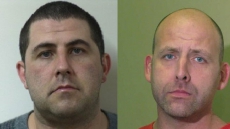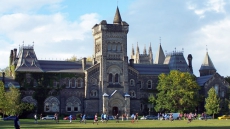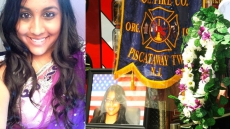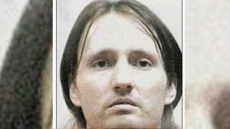TORONTO — It appears the world finally has an effective Ebola vaccine.
A new study reported Friday that a vaccine designed by scientists working at Canada's National Microbiology Laboratory in Winnipeg induces a quick and highly protective response against the virus.
This is the first time an experimental Ebola vaccine has been shown to protect people against the deadly disease.
The former director of the Winnipeg lab, Dr. Frank Plummer, was ecstatic about the news.
"I think it's fantastic. For the NML and the whole team that was involved in this, it's the culmination of 15 years of work. It's very, very exciting. Very, very gratifying," said Plummer, who led the lab when the work was being done, but retired from that job last year.
There had been high hopes that this vaccine, called rVSV-ZEBOV, would be effective. But in science, assumptions don't count — data do.
And the data from this trial, conducted in Guinea, are persuasive, suggested Dr. Marie-Paule Kieny, a senior author of the trial and the World Health Organization's point person for development of Ebola vaccines and drugs.
"It suggests it works, it works pretty quickly, and it works well," Kieny said.
In fact, the vaccine protected 100 per cent of the people who received it. While experts caution that number will probably come down when the vaccine is used in more people, it's a very good result.
The findings are reported today in the medical journal The Lancet.
The study was actually meant to continue for a longer time, but an interim analysis conducted by the trial's data and safety monitoring board concluded the vaccine was working.
The board of outside experts advised the researchers to stop using a control group and offer vaccine going forward to all the people who met the criteria for the study.
The study was led by the WHO and involved a variety of partners including the governments of Guinea and Norway, the Public Health Agency of Canada, Medicins Sans Frontieres and Britain's Wellcome Trust charity.
It is one of several underway in West Africa trying to prove whether a number of vaccines and therapies protect against Ebola or help people infected with it to survive. But with case counts now down to a trickle — only seven last week — there had been fears none of the trials would come up with definitive answers.

That this one did is a coup.
"To be able to conduct a study like this and find these results when case numbers were plummeting . . . I think is really a major public health achievement," said Michael Osterholm, director of the Center for Infectious Diseases Research and Policy at the University of Minnesota.
The trial was conducted using what is called a ring vaccination design.
The idea behind ring vaccination is to create a buffer of protection around each case, so that the virus cannot continue to spread. This is actually the way the scientists who designed the vaccine intended for it to be used.
When new cases of Ebola were diagnosed, the researchers offered to vaccinate people who had been in contact with the infected person, and the contacts of those contacts.
Some of the rings of people were vaccinated immediately. Others were told they would be vaccinated after a delay of three weeks. And then researchers watched to see how many people in the two types of rings became infected.
In the first few days, there were infections in both rings. That is not surprising; a vaccine takes time to kick start the immune system to protect against a new pathogen.
But after 10 days — the point at which the researchers assumed the vaccine would have done its job — they saw no additional cases in the rings of vaccinated people. However, new cases continued to crop up in the rings of people who were randomly assigned to get vaccinated after the three-week delay.
"We have nobody in the 2,000 or so people who have been vaccinated (early) who have had an Ebola (diagnosis) 10 days after the vaccination. Nobody, zero," said Kieny.
The same pattern — a complete drop off in cases - was seen later when the people in the delayed rings were given the vaccine.
Kieny said discussions will now need to take place with the government of Sierra Leone to see if they want to employ a ring vaccination approach in a bid to finally snuff out the 19-month-old West African outbreak.
News of the success comes a week before the one-year anniversary of the day the World Health Organization declared the unprecedented West African outbreak a global public health emergency.
To date there have been nearly 28,000 cases and nearly 11,300 deaths.

The rVSV-ZEBOV vaccine is being developed commercially by pharmaceutical giant Merck and NewLink Genetics, a biotech firm based in Ames, Iowa.
Last year the Canadian government donated 800 multi-dose vials of the vaccine to the World Health Organization. Some of that donated vaccine was used in the early stage clinical trials conducted to determine whether rVSV-ZEBOV was safe for people and to decide how much vaccine each person might need.






